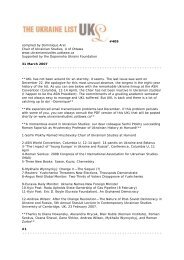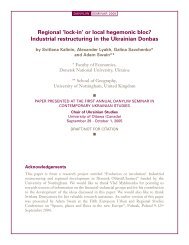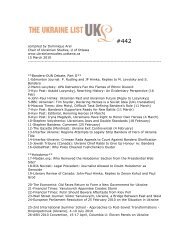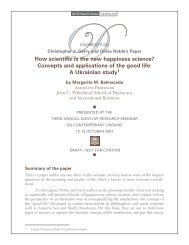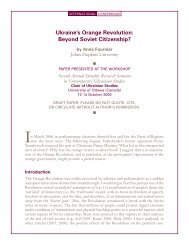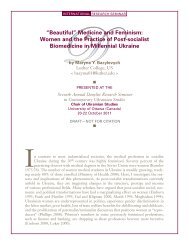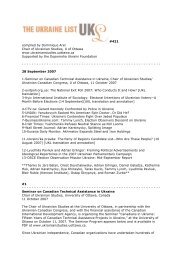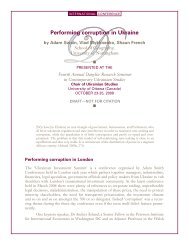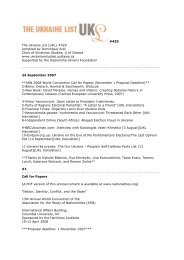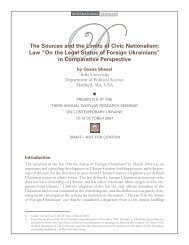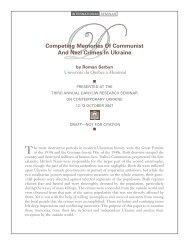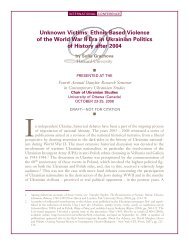Citizenship and nation-building in Ukraine - Chair of Ukrainian Studies
Citizenship and nation-building in Ukraine - Chair of Ukrainian Studies
Citizenship and nation-building in Ukraine - Chair of Ukrainian Studies
Create successful ePaper yourself
Turn your PDF publications into a flip-book with our unique Google optimized e-Paper software.
INTERNATIONAL CONFERENCE<br />
was their geopolitical objectives. 23 The left’s conception <strong>of</strong> <strong>nation</strong>al identity <strong>and</strong> result<strong>in</strong>g<br />
preference for statehood made the question <strong>of</strong> the <strong>of</strong>ficial <strong>nation</strong> <strong>of</strong> the Ukra<strong>in</strong>ian state<br />
a tricky one for the Ukra<strong>in</strong>ian left. The very question, “who belong to the <strong>nation</strong> <strong>of</strong> the<br />
Ukra<strong>in</strong>ian state” implies the normalcy <strong>of</strong> a situation where the Ukra<strong>in</strong>ian state exists <strong>and</strong><br />
functions like other states. The citizenship law that def<strong>in</strong>ed the <strong>of</strong>ficial <strong>nation</strong> <strong>of</strong> the<br />
Ukra<strong>in</strong>ian state <strong>and</strong> did not provide for a dual citizenship with Russia did absolutely<br />
noth<strong>in</strong>g for the left’s ultimate goal: a jo<strong>in</strong>t state with Russia <strong>and</strong> Belarus. If one is aware<br />
<strong>of</strong> this, the left’s lack <strong>of</strong> <strong>in</strong>terest <strong>in</strong> the citizenship law makes sense. Fail<strong>in</strong>g to prevent citizenship<br />
legislation all together, the left’s strategy has been to push for dual citizenship.<br />
Dual citizenship blurs borders between <strong>nation</strong>al communities, <strong>and</strong> as such is an <strong>in</strong>strument<br />
that could br<strong>in</strong>g closer the left’s ultimate goal <strong>of</strong> a jo<strong>in</strong>t state. 24 The left’s support<br />
for dual citizenship thus also makes sense.<br />
The issue <strong>of</strong> dual citizenship was at the center <strong>of</strong> the citizenship law debate <strong>in</strong><br />
1991, when it almost came to pass. The clause “dual citizenship is allowed” failed by just<br />
two votes. 25 The f<strong>in</strong>al word<strong>in</strong>g <strong>in</strong> the 1991 law was a compromise that allowed for a possibility<br />
<strong>of</strong> dual citizenship under bilateral agreements. 26 No such agreements ever materialized,<br />
however. The executive branch, <strong>in</strong> particular the <strong>Citizenship</strong> Department <strong>of</strong> the<br />
Presidential Adm<strong>in</strong>istration that has been <strong>in</strong> charge <strong>of</strong> the citizenship policy on day to<br />
day basis, rema<strong>in</strong>ed adamant on ma<strong>in</strong>ta<strong>in</strong><strong>in</strong>g s<strong>in</strong>gle citizenship. Ukra<strong>in</strong>ian <strong>of</strong>ficials<br />
described preservation <strong>of</strong> s<strong>in</strong>gle citizenship as a matter <strong>of</strong> <strong>nation</strong>al <strong>in</strong>terests, <strong>and</strong> opposed<br />
23. The 1998 electoral program <strong>of</strong> the Communist party endorsed “the recreation <strong>of</strong> the renewed family <strong>of</strong> brotherly<br />
people <strong>of</strong> the crim<strong>in</strong>ally-destroyed Soviet Union,” not<strong>in</strong>g that “the first step <strong>in</strong> this direction should be the creation<br />
<strong>of</strong> the Union <strong>of</strong> Russia, Ukra<strong>in</strong>e, <strong>and</strong> Belarus” (Politychni Partii Ukra<strong>in</strong>y 1998, 109). Before the 1999 presidential<br />
elections the Ukra<strong>in</strong>ian Communist leader Petro Symonenko spoke <strong>of</strong> the “Orthodox geo-cultural space”<br />
<strong>and</strong> appealed for the creation <strong>of</strong> an “Orthodox Slavic State.” (Symonenko as quoted <strong>in</strong> Bojcun 2001). More recently,<br />
<strong>in</strong> May 2000, Heorhii Kriuchkov, one <strong>of</strong> the key ideologues <strong>of</strong> the Ukra<strong>in</strong>ian Communist party, argued along<br />
similar l<strong>in</strong>es: “our [Communists’] goal is … to recreate a brotherly union <strong>of</strong> peoples that until recently lived as one<br />
happy family. The first steps on this road could be the creation … <strong>of</strong> a confederate-type Union <strong>of</strong> three Slavic<br />
states: Ukra<strong>in</strong>e, the Russian Federation, <strong>and</strong> Belarus.” Kriuchkov 2001, 115.<br />
24. That proponents <strong>of</strong> dual citizenship perceived a connection between the s<strong>in</strong>gle/dual citizenship issue <strong>and</strong> future<br />
prospects <strong>of</strong> the Ukra<strong>in</strong>ian statehood is evident, for example, from the 1998 electoral program <strong>of</strong> the Slavic Party<br />
that stood for a union <strong>of</strong> Russia <strong>and</strong> Ukra<strong>in</strong>e <strong>in</strong> a s<strong>in</strong>gle state. The party program is forthright: “the <strong>in</strong>troduction<br />
<strong>of</strong> the dual citizenship pr<strong>in</strong>ciple is the way towards one CIS citizenship.” Politychni Partii Ukra<strong>in</strong>y 1998, 71.<br />
25. As verbatim report from the second read<strong>in</strong>g <strong>of</strong> the 1991 citizenship law on 8 October 1991 shows, 224 MPs, 2 short<br />
<strong>of</strong> the 226 needed, voted for the word<strong>in</strong>g “dual citizenship is allowed.” Verkhovna Rada Ukra<strong>in</strong>y 1991a, 26.<br />
26. Dual citizenship question dom<strong>in</strong>ated the debate <strong>in</strong> the Rada <strong>in</strong> 1991. After provisions that explicitly allowed <strong>and</strong><br />
those that explicitly did not allow for dual citizenship failed, a compromised word<strong>in</strong>g was proposed. Article 1 <strong>of</strong> the<br />
1991 law read: “<strong>in</strong> Ukra<strong>in</strong>e there is s<strong>in</strong>gle citizenship. Dual citizenship is allowed on the basis <strong>of</strong> bilateral agreements.”<br />
Text <strong>of</strong> the 1991 Ukra<strong>in</strong>ian citizenship law <strong>in</strong> Pravda Ukra<strong>in</strong>y, 14 November 1991. This compromise word<strong>in</strong>g<br />
ga<strong>in</strong>ed 302 votes, a Constitutional majority (vot<strong>in</strong>g results <strong>in</strong> Verkhovna Rada Ukra<strong>in</strong>y 1991a, 28). The compromise<br />
was reached after MP Yemets, likely to appease supporters <strong>of</strong> dual citizenship <strong>and</strong> to encourage them to<br />
vote for the law, said that “the problem [<strong>of</strong> dual citizenship] will most likely arise <strong>in</strong> relations to Russia, <strong>and</strong> we<br />
probably will sign such an agreement [on dual citizenship].” (Verkhovna Rada Ukra<strong>in</strong>y 1991a, 12).<br />
9



